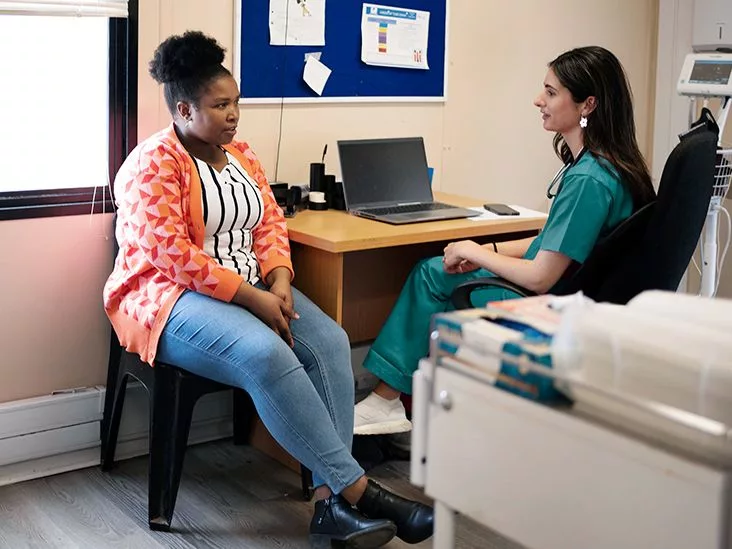Got a question about a change in your libido, a weird ache during sex, or just want to know if you’re up‑to‑date on STI testing? You don’t have to wait for a “big” problem to show up. A quick, honest chat with your clinician can give you the answers, treatment options, and peace of mind you deserve right now.
Why do we keep putting it off? Ignoring a small symptom can snowball into something more serious—think untreated infection, hormone imbalance, or even strain on a relationship. A few minutes of preparation can turn an uncomfortable moment into a powerful step toward owning your body and your health.
Why It Matters
What Happens If You Ignore a Minor Issue?
Most of us have heard the horror stories: “I thought my discharge was normal, then it turned out to be chlamydia and I struggled with infertility.” Small signs often hide big risks. Untreated STIs can lead to pelvic pain, infertility, or increase the chance of HIV transmission. Even non‑infectious concerns, like low estrogen after menopause, can affect bone health and mood if left unchecked.
How Early Disclosure Improves Outcomes
When you bring up a concern early, doctors can order the right tests before complications develop. For example, a simple urine test can catch asymptomatic gonorrhea, and a hormone panel can pinpoint the cause of a fading libido. Early treatment usually means fewer pills, shorter recovery, and lower healthcare costs.
Real‑World Example
Emily, 29, visited her GP after noticing occasional burning during intercourse. She was nervous, but after a concise 5‑minute list, her doctor ordered a culture that revealed a yeast infection. Treated promptly, Emily’s symptoms vanished and she avoided a potential chronic issue.
Expert Insight
According to a recent Healthline article, patients who discuss sexual health early are up to 30% more likely to receive appropriate preventive care.
Prep Your Visit
Build a Simple Talking‑Points List
Write down the main issue in one sentence, then add bullet points for details:
- When did the symptom start?
- How often does it happen?
- Any patterns (e.g., after intercourse, during a certain time of month)?
- Current meds, birth‑control, supplements
- Partner(s) status and any concerns they have
Seeing a visual cue helps you stay focused and prevents you from forgetting anything important.
Bring Relevant Records
If you’ve had recent lab work, a copy of those results can speed up the conversation. Some people bring a printed copy of their menstrual calendar or a note about any over‑the‑counter creams they’ve tried.
Ask for Extra Time
Most offices schedule 15‑minute slots, but a sexual‑health conversation often needs a bit more room. Call the front desk and say, “I’d like a 30‑minute appointment to discuss some sexual‑health questions.” Most clinics will accommodate when they know ahead of time.
Printable Checklist
| What to Bring | Why It Helps |
|---|---|
| List of symptoms | Keeps the talk focused |
| Medication list | Identifies possible side‑effects |
| Recent lab results | Avoids duplicate testing |
| Partner info (if comfortable) | Guides testing and counseling |
Start the Conversation
Opening Lines That Feel Natural
Try one of these:
- “Can we talk about my sexual health today?”
- “I’ve been having some concerns about my libido; could we discuss them?”
- “I’m due for STI testing—what do you recommend?”
Direct language shows you’re serious and saves everyone time.
Neutral Language vs. Slang
Doctors are trained professionals; they understand medical terms. However, using everyday words can feel less intimidating. For instance, “pain during sex” works just as well as “dyspareunia.” If you’re comfortable, you can sprinkle in the technical term; it won’t hurt.
Tips for LGBTQIA+ Patients
Sexual orientation and gender identity can change the questions a doctor asks. If you think your provider might not be familiar with your experience, you can say, “I identify as non‑binary, and I have a few questions about hormone therapy and STI screening.” This sets the stage for a respectful, tailored conversation.
Dialogue Example
| Patient | Doctor |
|---|---|
| “I’ve been feeling less desire lately and I’m not sure why.” | “Let’s explore possible causes—stress, meds, hormones, or something else.” |
| “Also, I’m due for my annual STI screen. What tests do you recommend?” | “We’ll do a comprehensive panel: chlamydia, gonorrhea, HIV, syphilis, and HPV if you haven’t been vaccinated.” |
Common Topics to Raise
STI Screening & Prevention
Even if you feel fine, many infections are silent. Ask about a full panel that includes HIV, chlamydia, gonorrhea, syphilis, and HPV. If you’re sexually active with multiple partners, consider quarterly testing.
Hormonal Concerns
Low libido, irregular periods, or hot flashes can be hormone‑related. A simple blood test for estrogen, testosterone, and thyroid function can reveal a lot.
Painful Sex (Dyspareunia)
Lubrication issues, infections, or pelvic floor tension are common culprits. Mention any discomfort so the doctor can check for yeast infections, bacterial vaginosis, or refer you to a pelvic‑floor therapist.
Erectile or Female Sexual Dysfunction
These aren’t “just in your head.” They often have physical roots—vascular health, medication side‑effects, or psychological stress. Bring them up; treatments range from medication to counseling.
Birth‑Control Choices
Whether you’re thinking about the pill, an IUD, condoms, or a new implant, ask about effectiveness, side‑effects, and how each method interacts with your sexual health goals.
Mini‑FAQ (Featured Snippet Ready)
| Question | Quick Answer |
|---|---|
| How often should I get STI tested? | At least once a year, or more often if you have new or multiple partners. |
| Can birth‑control affect my libido? | Yes—some hormonal methods can lower desire; discuss alternatives with your doctor. |
| Is it normal to feel pain during sex? | Occasional soreness can be normal, but persistent pain should be evaluated. |
| Do I need a specialist for sexual‑health issues? | Start with your primary care doctor; they can refer you to a urologist, OB‑GYN, or sex therapist if needed. |
What Happens After You Speak Up
Possible Tests, Referrals, Treatments
Depending on what you share, the doctor may order:
- Urine or swab cultures for STIs
- Blood panel for hormones and thyroid
- Pelvic exam or rectal exam
- Referral to a specialist (sex therapist, urologist, pelvic‑floor physio)
Confidentiality & Your Rights
In the U.S., HIPAA protects your medical information. Your doctor cannot share details without your explicit permission. If you’re worried, you can ask, “What privacy protections apply to this conversation?”
When to See a Specialist
If symptoms persist after initial treatment, or if you need more focused care (e.g., erectile dysfunction medications, complex hormonal therapy), your doctor can refer you. Specialists bring deeper expertise and often have multidisciplinary teams.
Primary‑Care vs. Specialist Roles
| Provider | Typical Role | Typical Wait Time |
|---|---|---|
| Primary Care Physician | Initial assessment, basic labs, counseling | Same‑day to 2 weeks |
| Urologist / OB‑GYN | Focused diagnostics, advanced treatments | 2–6 weeks |
| Sex Therapist | Psychological counseling, relationship guidance | 1–4 weeks |
| Pelvic‑Floor Physio | Physical therapy for pain, muscle control | 1–3 weeks |
Overcoming Barriers & Staying Proactive
Dealing With Embarrassment
It’s okay to feel awkward—most people do. One trick is to rehearse what you’ll say with a trusted friend or in the mirror. The more you practice, the less “heat” you’ll feel when the moment arrives.
If Your Doctor Dismisses You
Sometimes clinicians may not ask follow‑up questions or may brush off concerns. You have the right to a second opinion. Politely say, “I’d like to explore this further; could you refer me to someone with more experience in sexual health?”
Finding the Right Provider
Look for credentials like “Board Certified in Sexual Medicine” or “Specialist in Reproductive Health.” Many clinic websites list provider bios; you can also call the office and ask, “Do you have a clinician who regularly discusses sexual health?”
Helpful Resources
According to HealthLink BC, many communities have dedicated sexual‑health clinics that offer confidential, no‑cost counseling and testing.
Keep the Conversation Going
Sexual health isn’t a one‑time checkbox. Schedule routine check‑ins, especially after life changes like new partners, pregnancy, or medication adjustments. Treat it like any other preventive care—annual, proactive, and empowering.
Quick‑Reference Cheat Sheet
Top 7 Questions to Ask
- What STI tests do I need right now?
- Are my symptoms linked to a medication I’m taking?
- Should I consider a hormone panel?
- What birth‑control method fits my lifestyle best?
- Can you suggest a pelvic‑floor therapist if pain persists?
- How often should I schedule follow‑up visits?
- What resources are available if I need counseling?
Notes Section (print & fill out during the visit)
Use this space to jot down the doctor’s answers, any prescribed meds, and next steps. Having a written record helps you remember details and shows you’re engaged.
Conclusion
Talking to a doctor about sexual health might feel a little nerve‑wracking, but it’s one of the smartest things you can do for yourself. By preparing a brief list, using clear language, and knowing what to expect, you turn a potentially awkward moment into a confident step toward better wellbeing. Your sexual health is a normal, essential part of overall health—don’t let stigma or embarrassment keep it in the dark.
Ready to take action? Download the cheat sheet, book a 30‑minute appointment, and let your doctor know you’re ready to talk. You deserve answers, you deserve care, and you deserve to feel good about your body. If you have any questions or want to share your own experience, drop a comment below—let’s keep the conversation going!


















Leave a Reply
You must be logged in to post a comment.